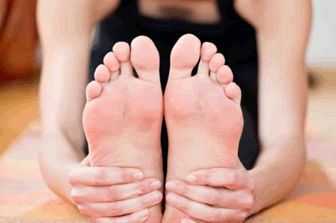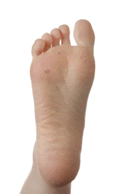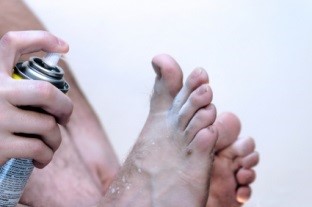Blog
Doctor Discusses Plantar Fasciitis Treatment
 In an interview with NPR, Dr. Navan Duggal discusses plantar fasciitis as well as treatment for the condition. Two million people in the United States, with men and runners being the most prominent, suffer from plantar fasciitis every year. The condition occurs when the plantar fascia, the thick band running from the toes to the heel of the feet, receives excessive strain and trauma causing pain near the heel. “Usually the problem is that patients have this pain and they haven’t really addressed it,” Duggal States. Sometimes the condition starts as mild pain in the heel or through a tight Achilles tendon or calf muscle. Duggal also states that stretching the feet as well as wearing orthotic inserts helps relieve the pain of plantar fasciitis.
In an interview with NPR, Dr. Navan Duggal discusses plantar fasciitis as well as treatment for the condition. Two million people in the United States, with men and runners being the most prominent, suffer from plantar fasciitis every year. The condition occurs when the plantar fascia, the thick band running from the toes to the heel of the feet, receives excessive strain and trauma causing pain near the heel. “Usually the problem is that patients have this pain and they haven’t really addressed it,” Duggal States. Sometimes the condition starts as mild pain in the heel or through a tight Achilles tendon or calf muscle. Duggal also states that stretching the feet as well as wearing orthotic inserts helps relieve the pain of plantar fasciitis.
Plantar fasciitis can be very painful and inconvenient. If you are experiencing heel pain or symptoms of plantar fasciitis, visit Dr. Michael E. Newman of Pennsylvania. Our doctor can treat your heel pain as well as any other foot or ankle condition.
What is Plantar Fasciitis?
Plantar fasciitis is the inflammation of a the thick band of tissue that runs along the bottom of your foot, known as the plantar fascia, and causes mild to severe heel pain.
What Causes Plantar Fasciitis?
- Excessive running
- Non-supportive shoes
- Overpronation
- Repeated stretching and tearing of the plantar fascia
How Can It Be Treated?
- Conservative measures – anti-inflammatories, ice packs, stretching exercises, physical therapy, orthotic devices
- Shockwave therapy – sound waves are sent to the affected area to facilitate healing and are usually used for chronic cases of plantar fasciitis
- Surgery – usually only used as a last resort when all else fails. The plantar fascia can be surgically detached from the heel
While very treatable, plantar fasciitis is definitely not something that should be ignored. Especially in severe cases, speaking to your doctor right away is highly recommended to avoid complications and severe heel pain. Your podiatrist can work with you to provide the appropriate treatment options tailored to your condition.
If you have any questions, please contact our offices in Plymouth Meeting and Ambler, PA. We offer the newest diagnostic and treatment technologies for all your foot and ankle injuries.
Plantar Warts Will Not Necessarily Lead to Long Term Health Problems
 Dr. Faith of The Columbus Dispatch recently discussed the long term effects of plantar warts. Although plantar warts are caused by Human Papillomavirus (HPV) and certain strains of the virus have been associated with cancer, this does not mean your plantar wart will result in future complications. Often time most warts are benign and once they are treated effectively and gone, they will come back to cause additional problems. On certain occasions when a wart is not effectively treated, the virus might reappear on the skin after months or years of remaining unnoticed.
Dr. Faith of The Columbus Dispatch recently discussed the long term effects of plantar warts. Although plantar warts are caused by Human Papillomavirus (HPV) and certain strains of the virus have been associated with cancer, this does not mean your plantar wart will result in future complications. Often time most warts are benign and once they are treated effectively and gone, they will come back to cause additional problems. On certain occasions when a wart is not effectively treated, the virus might reappear on the skin after months or years of remaining unnoticed.
Plantar warts can be very unsightly and uncomfortable. If you have any concerns with plantar warts on your feet contact Dr. Michael E. Newman of Pennsylvania. Our doctor will treat your foot and ankle needs.
About Plantar Warts
Plantar warts are the result of HPV, or human papillomavirus, getting into open wounds on the feet. They are mostly found on the heels or balls of the feet.
While plantar warts are generally harmless, those experiencing excessive pain or those suffering from diabetes or a compromised immune system require immediate medical care. Plantar warts are easily diagnosed, usually through scraping off a bit of rough skin or by getting a biopsy.
Symptoms
• Legions on the bottom of your feet, usually rough and grainy
• Hard or thick callused spots
• Wart seeds, which are small clotted blood vessels that look like little black spots
• Pain, discomfort, or tenderness of your feet when walking or standing
Treatment
• Freezing
• Electric tool removal
• Laser Treatment
• Topical Creams (prescription only)
• Over-the-counter medications
To help prevent developing plantar warts, avoid walking barefoot over abrasive surfaces that can cause cuts or wounds for HPV to get into. Avoiding direct contact with other warts, as well as not picking or rubbing existing warts, will help prevent the further spread of plantar warts. However, if you think you have developed plantar warts, speak to your podiatrist. He or she can diagnose the warts on your feet and recommend the appropriate treatment options.
If you have any questions please feel free to contact our offices located in Plymouth Meeting and Ambler, PA. We offer the newest diagnostic tools and technology to treat your foot and ankle needs.
Health Benefits of Swimming
 When the warmer months begin to come through, pools open up bringing light to the health benefits of swimming. Since swimming involves nearly every muscle in the body, it is a great way to improve blood circulation in the feet and in many other parts of the body. The activity is also highly aerobic and can burn many calories without having to put the same amount of pressure on the ankles and feet as activities such as running or other forms of cardio. Swimming also helps stretch the ligaments in the body that may become less flexible with injury or age.
When the warmer months begin to come through, pools open up bringing light to the health benefits of swimming. Since swimming involves nearly every muscle in the body, it is a great way to improve blood circulation in the feet and in many other parts of the body. The activity is also highly aerobic and can burn many calories without having to put the same amount of pressure on the ankles and feet as activities such as running or other forms of cardio. Swimming also helps stretch the ligaments in the body that may become less flexible with injury or age.
Swimming is a great way to exercise the feet. If you have any questions regarding the benefits of swimming on the feet, consider contacting Dr. Michael E. Newman of Pennsylvania. Our doctor will explain the unique health advantages this activity has and recommend some simple exercises.
Benefits of Swimming and Foot care
Our feet receive the most stress on a daily basis. Walking, running, and long standing contribute to pain and stress on the feet. Swimming helps promote circulation and keep the body feeling great and healthy.
Benefits of swimming:
Improve blood circulation
- Swimming is a good, safe way to get in extra physical activity and improve circulation, without causing further trauma to the feet
Relieve aches or pains
- It takes all the pressure off of them, allowing the feet to relax and recover, and improves blood flow to them.
Circulation overall for diabetics
- Swimming contributes to blood flow, and increase oxygen levels within the body.
Reduce foot inflammation
- Swimming in warm water can increase blood flow and make it easier to move and stretch the afflicted foot. The feet are also exposed in water, giving them much needed air.
Swimming the helpful alternative:
Many people like the elderly and diabetics suffer from weakened muscles and joints. A water sport like swimming will support the body, thus allowing him or her to move freely. Blood flow circulation is a main trigger to tired inflamed feet.
If you have any questions, please feel free to contact our offices located in Plymouth Meeting and Ambler, PA. We offer the latest in diagnostic and treatment technologies to meet all your needs.
UK Woman Called Emergency Number because of Athlete’s Foot
 A woman from Conwy reportedly dialed 999—the U.K.’s 911—because she had athlete’s foot. This case was just one of the many “ludicrous” phone calls made to ambulance chiefs in Wales over the span of seven months.
A woman from Conwy reportedly dialed 999—the U.K.’s 911—because she had athlete’s foot. This case was just one of the many “ludicrous” phone calls made to ambulance chiefs in Wales over the span of seven months.
Other calls included a diner who felt their face burning after eating a red hot chilli pepper, someone who had two cotton buds stuck down their ear, a man who was feeling tired, and a man who had broken his two teeth and wanted dental work. Another woman from Rhyl called paramedics after pulling her side reaching for a phone charger.
Athlete’s foot is an inconvenient condition, but nothing to call an ambulance for. If you are concerned about your athlete’s foot contact Dr. Michael E. Newman of Pennsylvania. Our doctor will treat your foot and ankle needs.
Athlete’s Foot: The Sole Story
Athlete's foot, also known as tinea pedis, can be an extremely contagious foot infection. It is commonly contracted in public changing areas and bathrooms, dormitory style living quarters, around locker rooms and public swimming pools, or anywhere your feet often come into contact with other people.
Solutions to Combat Athlete’s Foot
- Hydrate your feet by using lotion
- Exfoliate
- Buff off nails
- Use of anti-fungal products
- Examine your feet and visit your doctor if any suspicious blisters or cuts develop
Athlete’s foot can cause many irritating symptoms such as dry and flaking skin, itching, and redness. Some more severe symptoms can include bleeding and cracked skin, intense itching and burning and even pain when walking. In the worst cases, athlete’s foot can cause blistering as well. Speaking to your podiatrist will give you a better understanding of the different causes of athlete’s foot, as well as helping you figure out which treatment options are best for you.
If you have any questions please feel free to contact our offices located in Plymouth Meeting and Ambler, PA. We offer the newest diagnostic tools and technology to treat your foot and ankle needs.
Read more about athlete’s foot.
